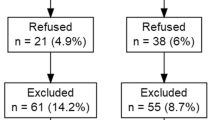Abstract
The main aim was to develop recommendations on eMental health interventions for the treatment of psychotic disorders. A systematic literature search on eMental health interventions was performed, and 24 articles about interventions in psychotic disorders were retrieved and systematically assessed for their quality. Studies were characterized by a large heterogeneity with regard to study type, sample sizes, interventions and outcome measures. Five graded recommendations were developed dealing with the feasibility of eMental health interventions, beneficial effects of psychoeducation, preliminary results of clinical efficacy, the need of moderation in peer support eMental health groups and the need to develop quality standards.

Similar content being viewed by others
References
Perälä J, Suvisaari J, Saarni SI, Kuoppasalmi K, Isometsä E, Pirkola S, Partonen T, Tuulio-Henriksson A, Hintikka J, Kieseppä T, Härkänen T, Koskinen S, Lönnqvist J (2007) Lifetime prevalence of psychotic and bipolar I disorders in a general population. Arch Gen Psychiatry 64:19–28
WHO. Global Health Estimates (2014) Summary tables: DALY by cause, age and sex, by WHO Region, 2000–2012. Retrieved on 14th Dec 2015. http://www.euro.who.int/en/health-topics/noncommunicable-diseases/mental-health/data-and-statistics
Gaebel W, Zielasek J (2015) Focus on psychosis. Dialogues Clin Neurosci 17:9–18
Tandon R, Nasrallah HA, Keshavan MS (2009) Schizophrenia, “just the facts” 4. Clinical features and conceptualization. Schizophr Res 110:1–23
Ormel J, Petukhova M, Chatterji S et al (2008) Disability and treatment of specific mental and physical disorders across the world: Results from the WHO World Mental Health Surveys. Br J Psychiatr 192:368–375
Salize HJ, McCabe R, Bullenkamp J, Hansson L, Lauber C, Martinez-Leal R, Reinhard I, Rössler W, Svensson B, Torres-Gonzalez F, van den Brink R, Wiersma D, Priebe S (2009) Cost of treatment of schizophrenia in six European countries. Schizophr Res 111:70–77
Loch AA, Wang YP, Guarniero FB et al (2014) Patterns of stigma toward schizophrenia among the general population: a latent profile analysis. Int J Soc Psychiatry 60:595–605
Kessler RC, Foster CL, Saunders WB, Stang PE (1995) Social consequences of psychiatric disorders, I: educational attainment. Am J Psychiatry 52:1026–1032
Moock J (2014) Support from the Internet for individuals with mental disorders: advantages and disadvantages of e-mental health service delivery. Front Public Health 2:65. doi:10.3389/fpubh.2014.00065
Showell C, Nohr C (2012) How should we define eHealth, and does the definition matter? In: Mantas J et al (eds) Quality of life through quality of information. European Federation for Medical Information and IOS Press, Amsterdam, pp 881–884
Mental Health Commission Canada (2014) E-Mental health in Canada: transforming the mental health system using technology. https://www.mentalhealthcommission.ca/English/system/files/private/document/MHCC_E-Mental_Health-Briefing_Document_ENG.pdf. Accessed 6 June 2015
Mucic D, Hilty DM (eds) (2016) e-Mental health. Springer International, Cham
Christensen H, Griffiths KM, Evans K (2002) E-Mental health in Australia: implications of the internet and related technologies for policy. ISC discussion paper No 3. 1–84. http://unpan1.un.org/intradoc/groups/public/documents/apcity/unpan046316.pdf. Accessed 25 Dec 2015
Mucic D (2010) Transcultural telepsychiatry and its impact on patient satisfaction. J Telemed Telecare 16:237–242
Haker H, Lauber C, Rössler W (2005) Internet forums: a self-help approach for individuals with schizophrenia? Acta Psychiatr Scand 112:474–477
Andrews G, Cuijpers P, Craske MG, McEvoy P, Titov N (2010) Computer therapy for the anxiety and depressive disorders is effective, acceptable and practical health care: a meta-analysis. PLoS One. 5(10):e13196. doi:10.1371/journal.pone.0013196
Cunningham JA, Gulliver A, Farrer L, Bennett K, Carron-Arthur B (2014) Internet interventions for mental health and addictions: current findings and future directions. Curr Psychiatr Rep 16:521
Gaebel W, Muijen M, Baumann AE et al (2014) EPA guidance on building trust in mental health services. Eur Psychiatry 29:83–100
Daly J, Willis K, Small R, Green J, Welch N, Kealy M, Hughes E (2007) A hierarchy of evidence for assessing qualitative health research. J Clin Epidemiol 60:43–49
SIGN grading system (1999–2012). http://www.sign.ac.uk/guidelines/fulltext/50/annexoldb.html. Accessed 27 Dec 2015
Naslund JA, Marsch LA, McHugo GJ, Bartels SJ (2015) Emerging mHealth and eHealth interventions for serious mental illness: a review of the literature. J Ment Health 28:1–12
Rotondi AJ, Anderson CM, Haas GL (2010) Web-based psychoeducational intervention for persons with schizophrenia and their supporters: one-year outcomes. Psychiatr Serv 61:1099–1105
Alvarez-Jimenez M, Gleeson JF, Bendall S, Lederman R, Wadley G, Killackey E, McGorry PD (2012) Internet-based interventions for psychosis: a sneak-peek into the future. Psychiatr Clin N Am 35:735–747
Kasckow J, Felmet K, Appelt C, Thompson R, Rotondi A, Haas G (2014) Telepsychiatry in the assessment and treatment of schizophrenia. Clin Schizophr Relat Psychoses 8:21A–27A
Glynn SM, Randolph ET, Garrick T, Lui A (2010) A proof of concept trial of an online psychoeducational program for relatives of both veterans and civilians living with schizophrenia. Psychiatr Rehabil J 33:278–287
Alvarez-Jimenez M, Alcazar-Corcoles MA, González-Blanch C, Bendall S, McGorry PD, Gleeson JF (2014) Online, social media and mobile technologies for psychosis treatment: a systematic review on novel user-led interventions. Schizophr Res 156:96–106
Gottlieb JD, Romeo KH, Penn DL, Mueser KT, Chiko BP (2013) Web-based cognitive-behavioral therapy for auditory hallucinations in persons with psychosis: a pilot study. Schizophr Res 145:82–87
Sin J (2013) Focus group study of siblings of individuals with psychosis views on designing an online psychoeducational rescource. J Psychosoc Nurs Ment HealthServ 51:28–36
Steinwachs DM, Roter DL, Skinner EA, Lehman AF, Fahey M, Cullen B, Everett AS, Gallucci G (2011) A web-based program to empower patients who have schizophrenia to discuss quality of care with mental health providers. Psychiatr Serv 62:1296–1302
Kaplan K, Salzer MS, Solomon P et al (2010) Internet peer support for individuals with psychiatric disabilities: a randomized, controlled trial. Soc Sci Med 72:54–62
Ben-Zeev D, Kaiser SM, Krzos I (2014) Remote “hovering” with individuals with psychotic disorders and substance use: feasibility, engagement, and therapeutic alliance with a text-messaging mobile interventionist. J Dual Diagn 10:197–203
Ben-Zeev D, Brenner CJ, Begale M, Duffecy J, Mohr DC, Mueser KT (2014) Feasibility, acceptability, and preliminary efficacy of a smartphone intervention for schizophrenia. Schizophr Bull 40:1244–1253
Ben-Zeev D, Frounfelker R, Morris SB, Corrigan PW (2012) Predictors of self-stigma in schizophrenia: new insights using mobile technologies. J Dual Diagn 8:305–314
Spaniel F, Vohlídka P, Hrdlicka J, Kozený J, Novák T, Motlová L, Cermák J, Bednarík J, Novák D, Höschl C (2008) ITAREPS: information technology aided relapse prevention programme in schizophrenia. Schizophr Res 98:312–317
Granholm E, Ben-Zeev D, Link P, Bradshaw KR, Holden JL (2012) Mobile assessment and treatment for schizophrenia (MATS): a pilot trial of an interactive text-messaging intervention for medication adherence, socialization, and auditory hallucinations. Schizophr Bull 38:414–425
Kauppi K, Välimäki M, Hätonen HM, Kuosmanen LM, Warwick-Smith K, Adams CE (2014) Information and communication technology based prompting for treatment compliance for people with serious mental illness. Cochrane Database Syst Rev 17:6
Schrank B, Sibitz I, Unger A et al (2010) How patients with schizophrenia use the internet: qualitative study. J Med Internet Res 12:e70
McInnes DK, Li AE, Hogan TP (2013) Opportunities for engaging low income, vulnerable populations in healthcare: A systematic review of homeless persons’ access to and use of information technologies. Am J Publ Health 103:e11–e24
Manu P, Dima L, Shulman M, Vancampfort D, De Hert M, Correll CU (2015) Weight gain and obesity in schizophrenia: epidemiology, pathobiology, and management. Acta Psychiatr Scand 132:97–108
Jahn T, Pitschel-Walz G, Gsottschneider A, Froböse T, Kraemer S, Bäuml J (2011) Neurocognitive prediction of illness knowledge after psychoeducation in schizophrenia: results from the Munich COGPIP study. Psychol Med 41:533–544
Author information
Authors and Affiliations
Corresponding author
Ethics declarations
Conflict of interest
The authors declare that they have no conflict of interest.
Additional information
Wolfgang Gaebel, Isabell Großimlinghaus, Ariane Kerst and Jürgen Zielasek have contributed equally to this work.
Rights and permissions
About this article
Cite this article
Gaebel, W., Großimlinghaus, I., Kerst, A. et al. European Psychiatric Association (EPA) guidance on the quality of eMental health interventions in the treatment of psychotic disorders. Eur Arch Psychiatry Clin Neurosci 266, 125–137 (2016). https://doi.org/10.1007/s00406-016-0677-6
Received:
Accepted:
Published:
Issue Date:
DOI: https://doi.org/10.1007/s00406-016-0677-6




